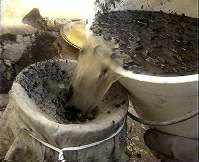 When we pray with the right attitude, particularly when kneeling before the altar of Sacrifice, joined in heart and mind with our mediator, the priest, Christ Himself makes up for what we are incapable of accomplishing on our own.
When we pray with the right attitude, particularly when kneeling before the altar of Sacrifice, joined in heart and mind with our mediator, the priest, Christ Himself makes up for what we are incapable of accomplishing on our own.
St. Augustine (+430) says that Jesus
“prays for us as our priest, prays in us as our Head, and is prayed to by us as our God. Therefore, let us acknowledge our voice in Him and His in us” (en Ps 85, 1).
What a magnificent starting point for you to use as a reflection on your own participation at Holy Mass!
With a minor variation this week’s Collect, for the 27th Ordinary Sunday (Novus Ordo), was in the ancient Gelasian Sacramentary and in the post-Tridentine editions of the Missale Romanum for the 11th Sunday after Pentecost.
Omnipotens sempiterne Deus, qui abundantia pietatis tuae et merita supplicum excedis et vota, effunde super nos misericordiam tuam, ut dimittas quae conscientia metuit, et adicias quod oratio non praesumit.
Supplex, an adjective used also as a substantive, is “humbly begging or entreating; beseeching; supplicant.” In the ancient world it was not uncommon for the supplicant to wrap his arms around (plecto) the knees of the one from whom he was begging the favor.
LITERAL TRANSLATION:
Almighty and everlasting God, who in the abundance of Your goodness surpass both the merits and the prayerful vows of suppliants, pour forth Your mercy upon us, so that You set aside those things which our conscience fears, and apply what our prayer dares not.
OBSOLETE ICEL (1973):
Father, your love for us surpasses all our hopes and desires. Forgive our failings, keep us in your peace and lead us in the way of salvation.
What a joke. Compare and contrast! We endured this for decades. No wonder the faith is so enervated.
CURRENT ICEL (2011):
Almighty ever-living God, who in the abundance of your kindness surpass the merits and the desires of those who entreat you, pour out your mercy upon us to pardon what conscience dreads and to give what prayer does not dare to ask.
We have a contrasting pair: God must remove from us our sins which merit punishment in justice, and He must add to us His graces which we can never merit.
We are unworthy, incredibly audacious beggars.
Our Collect gives us a model for an attitude of prayer.
We present ourselves, in the priest’s prayer, as one who is supplex, a suppliant frightened by the Judge because of the sins which bother his conscience.
This lowly beggar prays and prays, entwining his arms about the knees of his only hope.
He petitions the Almighty Father, merciful and good, to calm his fears by removing his damning sins totally and then by supplying him with whatever he dares not ask or does not even know that he ought to beg for (non praesumit).
He simultaneously has the humility of the kneeling suppliant and the boldness of sonship. He dares that which is far beyond his own capacity because God the Father made him His son through a mysterious adoption.
He is emboldened to ask many things of the Father with faith and confidence (cf Mark 11:24 and 9:23). Luke recounts in chapters 11 and 18 Christ’s parables about the persistent, even audacious, prayer of petition.
In many places, celebrations of Holy Mass have been stripped not of pride but of humility.
Idiotic liberals will now respond,
“But Father! But Father! People like YOU – HATE Vatican II – want ARROGANT Masses loaded down with gold and lace and music the common little people can’t understand. We need humble Masses, with guitars and clay cups and burlap vestments – if any vestment at all. We luuuuuv Amoris and you racist homophobic xenophobes just lord it over El Pueblo with your high falutin’ languages, and rigid cassocks and hats and stuff. Liturgy should have hugs and … and children holding hands around the altar, and women distrib…. no, I mean non-gender specified…”
What I mean by liturgy stripped of humility means that, in many places, instead of abasing ourselves humbly before our awesome and mysterious God during the renewal of the Sacrifice of Calvary, we celebrate ourselves while somewhat remembering our non-judgmental buddy Jesus.
Jesus isn’t our pal.
Jesus is the Good Shepherd, not the Nice Shepherd.
Good shepherds say, “No!” and sometimes beat the flock to keep them from doing harm to themselves.
Vesting Holy Mass in the very best that human arts can attain is a response to the need to recognize who we are before God’s transcendent majesty, His just mercy.
It is no wonder that many liberals have screwy ideas about how to express humility in liturgical worship.
The concept of humility inherent in supplex was systematically expunged from the now–obsolete translations of prayers, contemporary music in parishes, and (in churches now lacking kneelers) architecture. Change how we pray, and you change what we believe, our very identity.
One of the most Catholic of prayers, nearly eliminated after Vatican II, underscores an important dimension of healthy spirituality. In the Dies Irae, the haunting sequence of the Requiem Mass, we contemplate our inevitable judgment by the Rex tremendae maiestatis… the King of fearful majesty, the iustus Iudex… our just Judge:
“Once the accursed have been confounded / delivered up to the stinging flames, / call me with the blessed. / Suppliant and bowing down (supplex et acclinis), / my heart ground down like ash, I pray: / Have a care for my end.”
The use of supplex in our prayers prompts an attitude of contrition for our sins which in turn gives greater joy to our more confident petitions. A lowly attitude keeps in focus the reality of our sins, God’s promises of forgiveness, the ordinary means of their cleansing, and thus the great joy we have in forgiveness and the hope of heaven. We need these contrasts in our prayers.
God takes our sins away, but only when we beg Him to. We remember them, but they no longer stain us. When we recall that we are ashes and we confess our sins to the priest, those sins are washed clean away.
Soap, by the way, was once made in part from ashes.
In ancient times, no doubt our distant ancestors noted that in the places where they often cooked meat over fires, the stones would be clean where the fat and ashes ran. Thus, they learned to make soap from the ashes and lye and fats of their sacrifices.
Living can be messy. Ministry can be dirty. In one of his finest sermons, St. Augustine explained Christ’s washing of the feet of the Apostles using the moment in the Song of Songs when the lover calls to his beloved to rise and come to him. She demures at first saying that she had already washed her feet and doesn’t want to dirty them. The world, the flesh and the Devil get to us. We besmirch ourselves. Christ wanted the Apostles to get up and get their feet dirty in His service and that He would wash them as they needed.
The grit of the world and the grease of the flesh and the grime of the Enemy must be constantly cleansed.
For Christ’s Blood to wash us clean of sin we need a heart as contrite as ashes.
To begin the cleansing, we must know what must be cleansed and then seek out the divine cleanser.
I’ll now get up on my soap box pulpit and urge you to examine your consciences and…
GO TO CONFESSION!



































In the 22y that I have had the privilege to attend the TLM almost exclusively, this Collect (of the 11th Sunday after Pentecost) is undoubtedly my favorite, to the point that I look forward to it each year! Having grown up (?) with the new rite, I had no recollection of it; seeing the 1970s ICEL “translation” explains why! I just remember being tremendously moved, some ~20y ago when I first took notice of it… and the next few Sundays (in the ‘62) are in a similar vein.